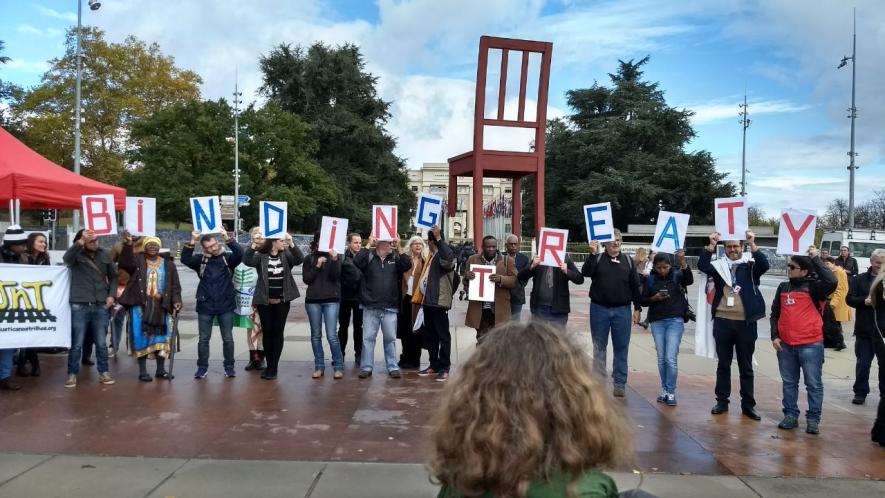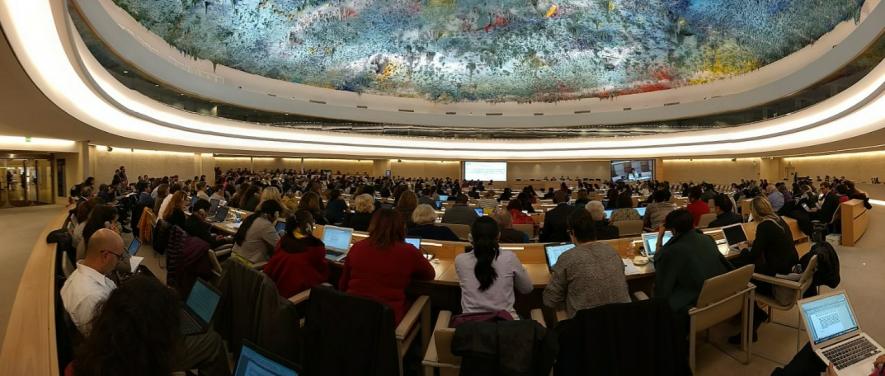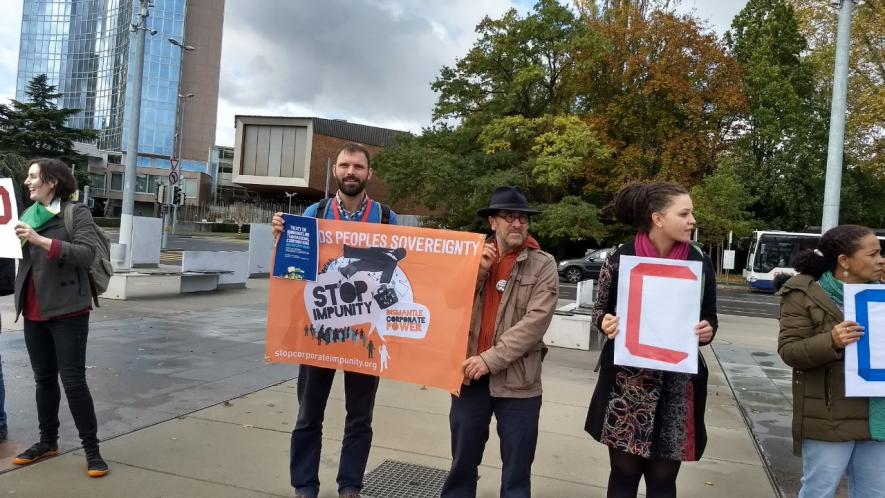As UN Negotiates Legal Accountability of Transnational Corporates on Human Rights, North-South Divide Resurfaces

Right now in Geneva, Ecuador is leading an unprecedented campaign to push the United Nations (UN) to adopt a legally binding treaty to end the impunity enjoyed by transnational corporations (TNCs) as they flagrantly violate human rights all over the world, especially developing countries.
But the third session of the UN Open-Ended Inter-Governmental Working Group (OEIGWG), going on from October 23 to 27, has once again brought to fore the divide between the so-called Global North, where most of the TNCs originate, and the Global South.
More than 400 activists representing social movements, peasants’ organisations, civil society groups and environmental justice groups — particularly from Latin America, Africa and Asia — have also come together in Geneva to intensify their demand that TNCs be held legally accountable for their exploitative practices and violations.

The UN working group was set up with the mandate to develop “an international legally binding instrument on TNCs and other business enterprises with respect to human rights” as per a resolution (Resolution 26/9) adopted by the UN Human Rights Council in June 2014.
In this third OEIGWG session (the first was held in 2015 and the second in 2016), Ecuador has presented and circulated among the delegates a 14-page draft it has prepared laying out the framework for the binding treaty negotiations.
Called the “Elements for the Draft Legally Binding Instrument on Transnational Corporations and Other Business Enterprises With Respect To Human Rights”, the draft is being discussed.
Ecuador, which is also the chair of the OEIGWG, has said the draft is based on more than 200 bilateral and multilateral meetings in Geneva and several other countries that have been held since the adoption of the UNHCR resolution on the binding treaty.
But while the United States has boycotted the session altogether, the European Union (EU) remains opposed to the adoption of a legally binding treaty for TNCs, raising two main objections.
First, the EU claims that the existing UN Guiding Principles (UNGP) on Business and Human Rights are enough — even though they are not legally enforceable — and that countries should instead focus on ensuring implementation of the UNGPs. In fact, the EU is even funding the National Action Plans for implementation of the UNGP in some developing countries.
The second objection of the EU was to the treaty applying specifically to TNCs and not to domestic corporations. They demanded that the legal scope be extended to include domestic companies as well.

However, as Ecuador – strongly supported by South Africa, among other countries – pointed out that the international treaties on terms of trade and investment also differentiate between transnational and domestic corporations. And expanding the treaty to include domestic companies would defeat the purpose of the treaty, since it is the transnational character of the corporate behemoths that leads to gaps in legal accountability when it comes to human rights violations by the branches and subsidiaries of the TNCs in developing countries.
As things stand now, the TNCs enjoy rights and privileges granted by the free-trade treaties – pushed by the international trade institutions like the WTO and the international finance institutions (IFIs) like the World Bank, the International Monetary Fund, etc. – without assuming any obligations and responsibilities on their part.
In fact, the economic power that TNCs have allows them to interfere politically in the countries they are operating in, and they often influence the policy decisions, vetoing any move that might cut their profits. As a result, these corporations indulge in massive violations of human rights, environmental laws, and tax rules.
From land grabs and extractive mining, resulting in large-scale displacement and loss of livelihoods of entire communities as well as destruction of natural resources, to exploitative wages and labour conditions and job loss, the TNCs have done it all. But the affected communities have no legally secured access to justice so far. There have even been cases where the jurisdiction has become an issue, when the victims have tried to bring the offending TNC to book.
Speaking to Newsclick, Benny Kuruvilla of the Transnational Institute (TNI), which has been part of the mobilisation processes, said, “The existing global architecture of trade and international finance institutions is massively skewed, in favour of the big businesses, especially the transnational corporations, whereby their rights are legally protected. But there is no countervailing legal mechanism for corporate accountability.”
“This is a historic attempt that Ecuador is leading, given that TNCs are important political players in the global economy and recognising the level of influence that corporates exercise over governments,” said Kuruvilla, who is currently attending the session in Geneva.
Among others, the EU was joined in its opposition by Mexico (speaking in proxy for the US) and Australia, while Ecuador has the support of South Africa, Bolivia, Venezuela, Nicaragua, Uruguay Cuba, Philippines, Indonesia, etc.
The two behemoths in Asia, which have some of their own TNCs operating and exploiting in other countries – India and China – have not yet fully come clear on their stance. While India has provided “qualified support” to Ecuador, China has largely remained silent.
Massive people’s mobilisations have also been gathering steam and pushing for the treaty, particularly under two networks – the Treaty Alliance and the Global Campaign to Reclaim Peoples Sovereignty, Dismantle Corporate Power and End Impunity (or the Global Campaign).
Together, Treaty Alliance and Global Campaign represent more than 1,500 people’s organisations from across the world.
Global Campaign has even come up with its own ambitious proposal draft for the legal treaty, titled “Treaty on Transnational Corporations and Their Supply Chains with Regard to Human Rights”
Get the latest reports & analysis with people's perspective on Protests, movements & deep analytical videos, discussions of the current affairs in your Telegram app. Subscribe to NewsClick's Telegram channel & get Real-Time updates on stories, as they get published on our website.
























